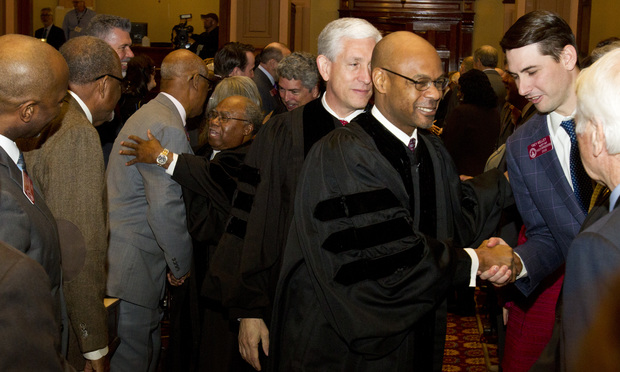COVID-19 Forces Ga. Supreme Court to Schedule Its First Virtual Court Sessions
Although the chief justice's statewide judicial emergency declaration is slated to expire April 13, the high court bench, except for the chief justice, will hear arguments from home beginning April 20.
March 27, 2020 at 02:59 PM
4 minute read
 Georgia Supreme Court Chief Justice Harold Melton (right), followed by Presiding Justice David Nahmias and Justice Robert Benham along with the other justices are greeted by Georgia lawmakers before Melton delivers a State of the Judiciary speech. (Photo: John Disney/ALM)
Georgia Supreme Court Chief Justice Harold Melton (right), followed by Presiding Justice David Nahmias and Justice Robert Benham along with the other justices are greeted by Georgia lawmakers before Melton delivers a State of the Judiciary speech. (Photo: John Disney/ALM)
For the first time in its history, the Supreme Court of Georgia will convene virtual court sessions next month to hear oral arguments in 19 cases.
Faced with keeping the courts in operation while COVID-19 continues to spread, Chief Justice Harold Melton on Friday announced the high court's plans for the virtual sessions, which will take place from April 20-24.
Over the course of the week, attorneys will argue 19 cases before the justices, who will be in front of their computers in their homes. Except for Melton, who will take his seat on the bench at the Nathan Deal Judicial Center in downtown Atlanta.
The virtual court sessions are scheduled to begin a week after Melton's statewide judicial emergency order is currently slated to end. On March 14, Melton declared a statewide judicial emergency, effective through April 13, to curtail the spread of the coronavirus to those who work in or are required to appear in court.
Melton's order asked judges across Georgia to prioritize matters such as domestic abuse restraining orders, juvenile court delinquency detention hearings and emergency removal matters, mental health commitment hearings, and cases "where an immediate liberty or safety concern is present requiring the attention of the court as soon as the court is available. Because Georgia does not have a unified court system, Melton must rely on his powers of persuasion rather than legal authority to curtail other court operations.
In his public announcement of the virtual court sessions, Melton expressed his hope that "it will go off without a hitch," but also asked for patience "if we run into some technological glitches."
The high court will use the videoconferencing service Zoom to link appellate lawyers and the bench. The high court also will livestream the virtual arguments over the internet, including to the general public. The Supreme Court has livestreamed oral arguments for several years.
Hansen said that, instead of seeing all the justices seated on the bench, online viewers will see each justice and the arguing lawyers in an enclosed video panel. Hansen said it should resemble the opening of the old television sitcom, "The Brady Bunch."
The April calendar also will include cases that were originally scheduled to take place this month but were canceled after Melton declared a judicial emergency.
Since early March, the chief justice has taken the lead in crafting the state judiciary's response to the pandemic. Melton is sitting in on Gov. Brian Kemp's coronavirus task force meetings, and on March 9 he notified the state's judges he will coordinate the judiciary's response to the outbreak.
The next day, the state Supreme Court issued an order temporarily waiving the in-person continuing legal education requirement for members of the State Bar of Georgia. Melton then took the unprecedented step of canceling all tours of the new judicial center until further notice, suspended swearing-in ceremonies for attorneys and asked that only those directly involved in oral arguments attend court sessions.
NOT FOR REPRINT
© 2025 ALM Global, LLC, All Rights Reserved. Request academic re-use from www.copyright.com. All other uses, submit a request to [email protected]. For more information visit Asset & Logo Licensing.
You Might Like
View All
12-Partner Team 'Surprises' Atlanta Firm’s Leaders With Exit to Launch New Reed Smith Office
4 minute read
After Breakaway From FisherBroyles, Pierson Ferdinand Bills $75M in First Year
5 minute read
On the Move: Freeman Mathis & Gary Adds Florida Partners, Employment Pro Joins Jackson Lewis
6 minute readTrending Stories
- 1How ‘Bilateral Tapping’ Can Help with Stress and Anxiety
- 2How Law Firms Can Make Business Services a Performance Champion
- 3'Digital Mindset': Hogan Lovells' New Global Managing Partner for Digitalization
- 4Silk Road Founder Ross Ulbricht Has New York Sentence Pardoned by Trump
- 5Settlement Allows Spouses of U.S. Citizens to Reopen Removal Proceedings
Who Got The Work
J. Brugh Lower of Gibbons has entered an appearance for industrial equipment supplier Devco Corporation in a pending trademark infringement lawsuit. The suit, accusing the defendant of selling knock-off Graco products, was filed Dec. 18 in New Jersey District Court by Rivkin Radler on behalf of Graco Inc. and Graco Minnesota. The case, assigned to U.S. District Judge Zahid N. Quraishi, is 3:24-cv-11294, Graco Inc. et al v. Devco Corporation.
Who Got The Work
Rebecca Maller-Stein and Kent A. Yalowitz of Arnold & Porter Kaye Scholer have entered their appearances for Hanaco Venture Capital and its executives, Lior Prosor and David Frankel, in a pending securities lawsuit. The action, filed on Dec. 24 in New York Southern District Court by Zell, Aron & Co. on behalf of Goldeneye Advisors, accuses the defendants of negligently and fraudulently managing the plaintiff's $1 million investment. The case, assigned to U.S. District Judge Vernon S. Broderick, is 1:24-cv-09918, Goldeneye Advisors, LLC v. Hanaco Venture Capital, Ltd. et al.
Who Got The Work
Attorneys from A&O Shearman has stepped in as defense counsel for Toronto-Dominion Bank and other defendants in a pending securities class action. The suit, filed Dec. 11 in New York Southern District Court by Bleichmar Fonti & Auld, accuses the defendants of concealing the bank's 'pervasive' deficiencies in regards to its compliance with the Bank Secrecy Act and the quality of its anti-money laundering controls. The case, assigned to U.S. District Judge Arun Subramanian, is 1:24-cv-09445, Gonzalez v. The Toronto-Dominion Bank et al.
Who Got The Work
Crown Castle International, a Pennsylvania company providing shared communications infrastructure, has turned to Luke D. Wolf of Gordon Rees Scully Mansukhani to fend off a pending breach-of-contract lawsuit. The court action, filed Nov. 25 in Michigan Eastern District Court by Hooper Hathaway PC on behalf of The Town Residences LLC, accuses Crown Castle of failing to transfer approximately $30,000 in utility payments from T-Mobile in breach of a roof-top lease and assignment agreement. The case, assigned to U.S. District Judge Susan K. Declercq, is 2:24-cv-13131, The Town Residences LLC v. T-Mobile US, Inc. et al.
Who Got The Work
Wilfred P. Coronato and Daniel M. Schwartz of McCarter & English have stepped in as defense counsel to Electrolux Home Products Inc. in a pending product liability lawsuit. The court action, filed Nov. 26 in New York Eastern District Court by Poulos Lopiccolo PC and Nagel Rice LLP on behalf of David Stern, alleges that the defendant's refrigerators’ drawers and shelving repeatedly break and fall apart within months after purchase. The case, assigned to U.S. District Judge Joan M. Azrack, is 2:24-cv-08204, Stern v. Electrolux Home Products, Inc.
Featured Firms
Law Offices of Gary Martin Hays & Associates, P.C.
(470) 294-1674
Law Offices of Mark E. Salomone
(857) 444-6468
Smith & Hassler
(713) 739-1250







